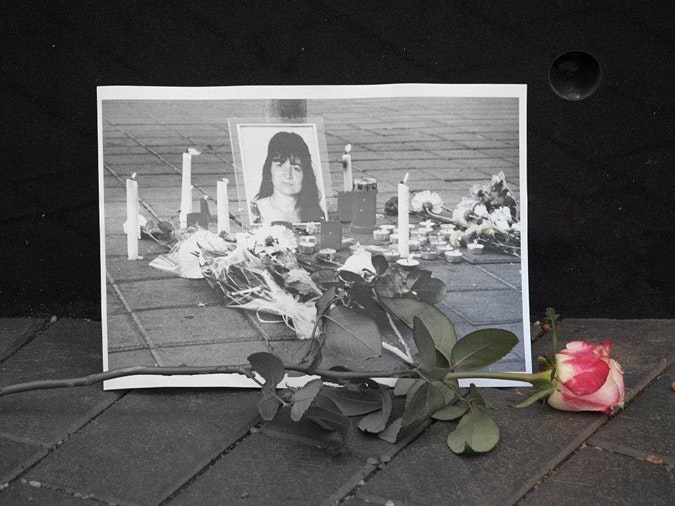Remembering the Roma Holocaust
By Bernard Rorke

In Budapest today, a group of citizens gathered at the Holocaust memorial on the banks of the Danube in a silent and solemn commemoration for the estimated half-million Roma who perished in the Baro Porrajmos ("Great Devouring") at the hands of the Nazis and their collaborators.
The death toll included almost 3,000 Roma men, women, and children who were put to death on the night of August 2-3, 1944, when the Germans liquidated the Zigeunerlager ("Gypsy camp") at Auschwitz-Birkenau. The camp leadership originally decided to murder the inhabitants of the "Gypsy compound" in May 1944. Some 50-60 members of a special SS unit sealed off the compound and ordered the Roma out. Forewarned, the Roma armed themselves with iron bars, pipes, shovels, and any other improvised weapons to hand and refused to move.
In the face of resistance, the SS withdrew and called off the operation. Three thousand Roma capable of work were then transferred to other camps. Some two months later the SS liquidated the 2,898 who remained. Most of the victims were ill, elderly men, women, and children. A handful of children who had hidden during the operation were captured and killed in the following days.
Flowers were also laid and candles lit at the memorial to honor the memory of men, women, and children murdered just two years ago by neo-Nazis in the wave of gun and bomb attacks targeting Roma settlements in Hungary. The killings took place against a backdrop of prejudiced media reporting, widespread anti-Gypsyism, and far-right paramilitarism fomented by the extremist party Jobbik and its uniformed squadristi. Similarly, the Czech Republic has witnessed neo-fascist attacks on Roma communities. OSCE Ambassador Janez Lenar?i? recently expressed concern at the surge in extremist intimidation of Roma communities and "manifestations of intolerance, including anti-Roma rhetoric from public figures at the national and local level."
A prescient warning by Czech president Vaclav Havel back in 1995, at the unveiling of a monument in memory of the Roma victims of the Holocaust in Lety, resonates with even more urgency today. Havel warned of the dangers in not facing up to every manifestation of racist evil:
Even today, we sometimes hear people calling "Gypsies to the gas chambers." Even today, we can observe indifference to these calls, quiet support for those who are yelling them, cowardly spectators, the renewal of divisions between people according to their ethnic origin. All of this must be faced up to again and again, because it is the tried-and-true territory of racism.
At the same site, 16 years later to the day, in 2011, Czech Green Party leader Ond?ej Liška called on Czech society to honor the memories of those who were tortured and who perished in the Lety camp in a dignified way, and described the nearby pig farm an insult to both the living and the dead. He declared that "a large part of Czech society either does not know how to admit their share of historical blame for the fate of the Roma people here, or does not want to admit it." He described the political elites as deeply complicit in this "cowardice" and lambasted them for facilitating a shift towards racism, tinged with populism on the national political scene, and fostering public indifference to the fate of those who perished at Lety and of those who were deported from there to Auschwitz-Birkenau.
The youngest of the Lety inmates deported in a mass transport in May 1943 were one-month-old Ji?í R?ži?ka and one-year-old Blažej R?ži?ka. In the 21st century, anti-Gypsyism continues to claim young victims. In February 2009, five-year-old Robika Csorba and his father were shot dead as they fled their firebombed house in Tatarszentgyorgy in Hungary. In April of that same year, in the Czech town of Vitkov, two-year-old Natálka Kudriková sustained 80 percent burns when her home was attacked with Molotov cocktails. In the Hungarian town of Kisleta in August 2009, 13-year-old Ketrin Balogh suffered multiple gunshot wounds in an attack on her home that killed her mother Maria.
In 1938, Hannah Arendt wrote: "That the Jews are the source of anti-Semitism is the malicious and stupid insight of anti-Semites." As though nothing was learned from the Holocaust, such malicious and stupid insights can be heard today with reference to the Roma. Mainstream political leaders who indulge in anti-Roma rhetoric for short term electoral gain, not only dishonor the dead, but imperil the living.
In the wake of the massacres in Norway, not even the most obtuse political leaders can remain complacent about the dangers posed by right-wing extremism. It may even dawn on them that populist pandering to anti-Roma racism is playing with fire; that racism is, as Havel warned so many years ago, a truly dangerous phenomenon, damaging to the entire society.
Until December 2013, Bernard Rorke was international research and advocacy director for the Roma Initiatives Office.


